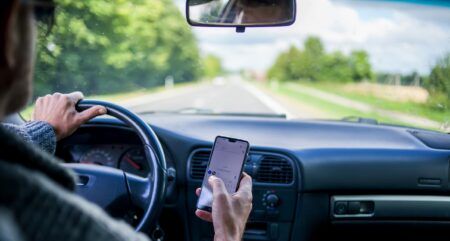The UK government has introduced a new law to make it easier for police to catch and convict drug drivers in England and Wales. Motorists that attempt to drive after taking illegal drugs face a criminal record, loss of their license for at least a year, and a fine of up to £5,000 (US$7,700). The legislation makes it illegal to drive with certain drugs in the body above specified levels, including eight illegal drugs and eight prescription drugs. People using prescription drugs within recommended amounts will not be penalized. Police forces will have access to new screening equipment to test suspected drug drivers. Officers can screen drivers for cannabis and cocaine at the roadside, and they will also be able to test for these and other drugs including ecstasy, LSD, ketamine and heroin at a police station, even if a driver passes the roadside check. New devices that can test for a greater number of drugs at the roadside will be developed and introduced in the future.
The new law, coupled with the testing kits, will make it quicker to identify those driving under the influence of drugs and help the prosecution of drug drivers. It will remain an offence to drive when impaired by any drug, including medical drugs. The new law covers the use of eight drugs commonly associated with medicinal use, that are sometimes abused, that have been set at higher limits, based on the available evidence of the road safety risk and to reflect their use as medicines. The medications are: morphine or other opiate/opioid-based substances that are used to treat pain; diazepam; clonazepam; flunitrazepam; lorazepam; oxazepam; temazepam that is used to treat anxiety or inability to sleep; and methadone used to treat drug addiction. Amphetamine, which is used to treat attention deficit hyperactivity disorder (ADHD) and Parkinson’s disease, is also planned to be included within the offence shortly, subject to UK Parliamentary approval.
Announcing the new legislation, UK Road Safety Minister, Robert Goodwill, said, “This new law will save lives. We know driving under the influence of drugs is extremely dangerous; it devastates families and ruins lives. The government’s message is clear; if you take drugs and drive, you are endangering yourself and others and you risk losing your license and a conviction.” Dr Kim Wolff, reader in addiction science at King’s College London and an advisor for the government drug drive policy, commented, “Illegal drugs seriously impair skills required to drive safely, such as reaction time and decision making. In many cases those who take certain illegal drugs believe that they are safe to drive, but are in fact putting themselves and others at risk. Greater awareness of the dangers of drug driving is important as we move forward with this important step towards safer roads.”




